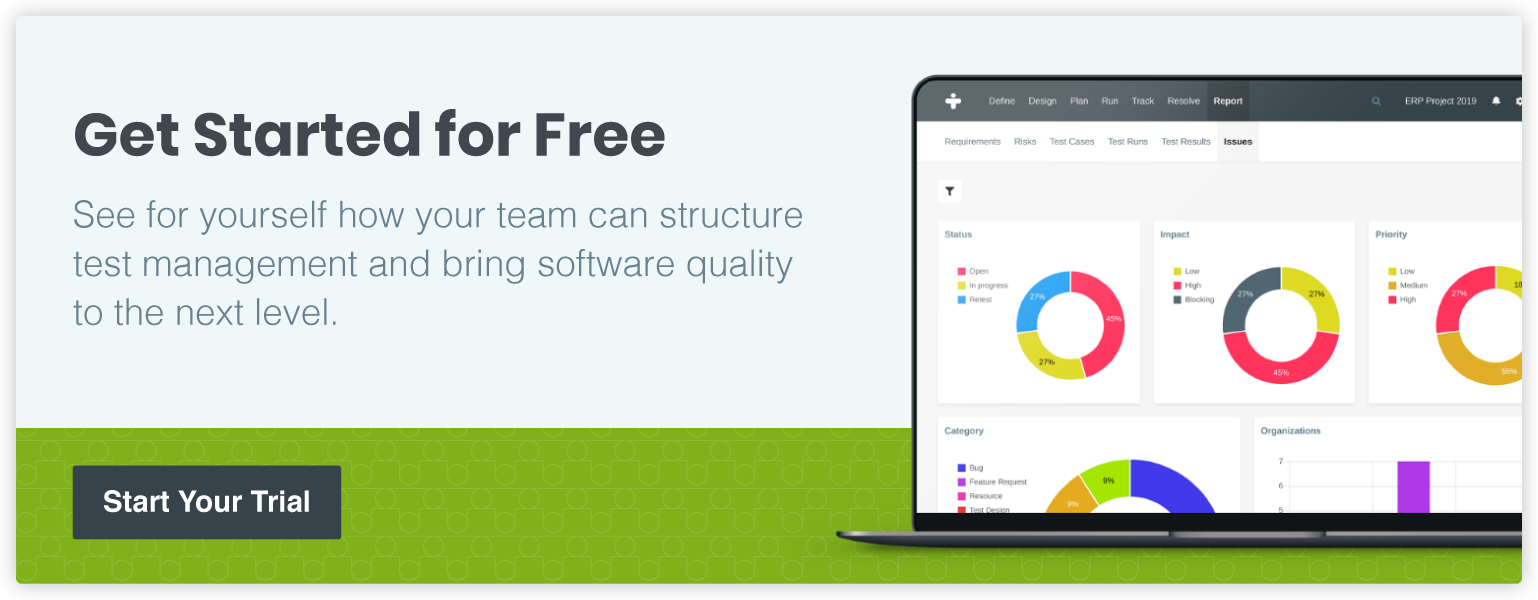What Is a Test Case Management Tool?
Software testing continues to integrate further into iterative development, and teams frequently collaborate across workspaces, time zones, and multiple projects. In the interest of releasing secure, bug-free software, there is an increasingly critical need for organized, structured, and consistent test case management.
Having a test case management tool can be a real differentiator for teams.
From helping testers organize and streamline their test case management process to allowing better test coverage and improved collaboration, test case management tools should be a go-to resource for any quality assurance (QA) program.
What exactly is a test case management tool, and how does your team know what to look for to find the best solution for your needs?
What Is a Test Case Management Tool?
As software testing gets more complex and extensive, especially in Agile or DevOps environments, test case management tools help QA teams track the large number of test cases they will need to ensure that quality software is delivered to their end users.
These software applications provide a central repository for storing, organizing, tracking, and, ultimately, sequencing test cases into test runs. Test case management tools have the standard set of fields to capture key test case data, including test ID, test case name, expected results, and testing environments. In some cases, these tools offer built-in reporting functions that help QA professionals track testing progress and monitor defects.
Finally, leading test case management tools offer cloud accessibility and powerful collaboration features that make it easy for teams to work together, no matter where they are.
How Test Case Management Tools Can Help Your QA Process
QA professionals are increasingly turning to test case management tools to improve their software testing process in several key ways. In particular, test case management tools can help by:
- Reducing administrative effort: Simplifying the administrative tasks during the early stages of software testing by giving test managers easy access to a library of test cases they can build on.
- Aligning with testing best practices: Ensuring your team uses best practices and proper test coverage based on your organization’s software testing goals by offering a central repository of searchable test case templates.
- Reducing duplicate data entry: Integrating with other software development tools to reduce duplicate data entry, prevent teams from having to juggle multiple versions of cloud documents and spreadsheets, and increase productivity.
- Providing real-time testing status: Easily highlight insights into the testing process—such as testing progress and trends in test case results—to identify problem areas faster and enable data-driven decisions.
- Simplifying test documentation: Speed up the documentation and preparation phases to provide more time for actual testing.
What Makes a Great Test Case Management Tool?
Whether you’re in the market for your first test case management tool or your QA team is looking to level up its software testing toolset, your organization should put the following characteristics on your must-have list:
- Customizable and intuitive interface: In addition to being clear and intuitive to use, the tool should allow testers to customize their workflows, test case fields, and dashboards to meet their needs.
- Integration and collaboration tools: The tool should make it easy to share updates and notes with other users and integrate easily with other software tools—such as bug-tracking systems and test automation tools—to facilitate collaboration with a one-stop view of responsibilities.
- Dynamic test case library: The tool should streamline the ability for QA managers and testers to store, search, select, and update test cases to increase test case coverage, reduce the administrative element of test case preparation, and limit the risk of human error in test case development.
- Scalability: The tool should be scalable to accommodate the diversity of your software testing portfolios and testing team composition without compromising performance or usability.
- Security: The tool should be a secure, cloud-based application that is versatile enough to work on any platform, anywhere, at any time. It should also come with the necessary security features to protect sensitive information and prevent unauthorized access.
Time to Elevate Your Testing Game
Want a test case management tool that not only offers all of these must-have, powerful test case management tool features right out of the box but also includes the full suite of test management functionality your team needs to deliver fit-for-purpose software time after time?
This is exactly what TestMonitor is designed for. TestMonitor does more than just enable more efficient QA testing; it also accelerates and amplifies your team’s ability to perform high-quality, efficient, and comprehensive software testing, no matter the size and scope of your QA program.
Want to learn more about how TestMonitor does it? Check out this resource covering how TestMonitor is designed to deliver for developers.







